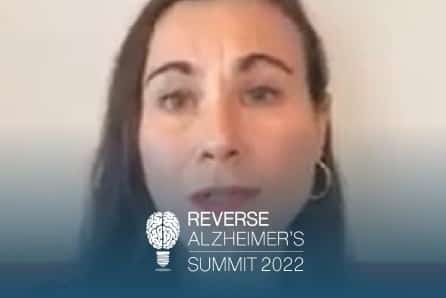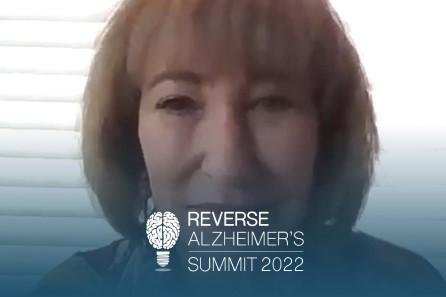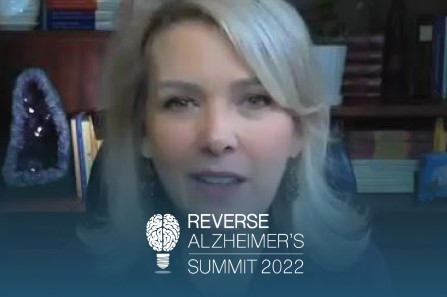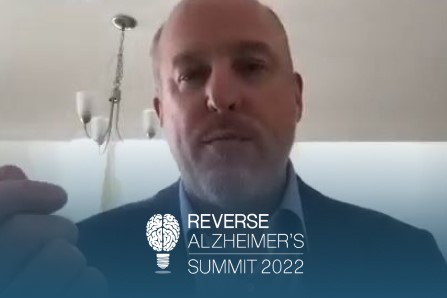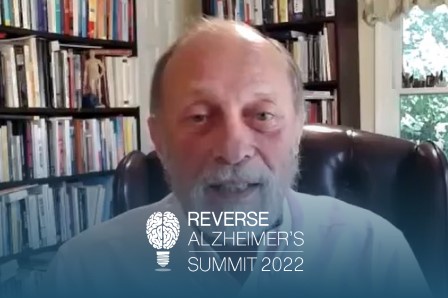Join the discussion below

Dr. Heather Sandison is the founder of Solcere Health Clinic and Marama, the first residential care facility for the elderly of its kind. At Solcere, Dr. Sandison and her team of doctors and health coaches focus primarily on supporting patients looking to optimize cognitive function, prevent mental decline, and reverse... Read More
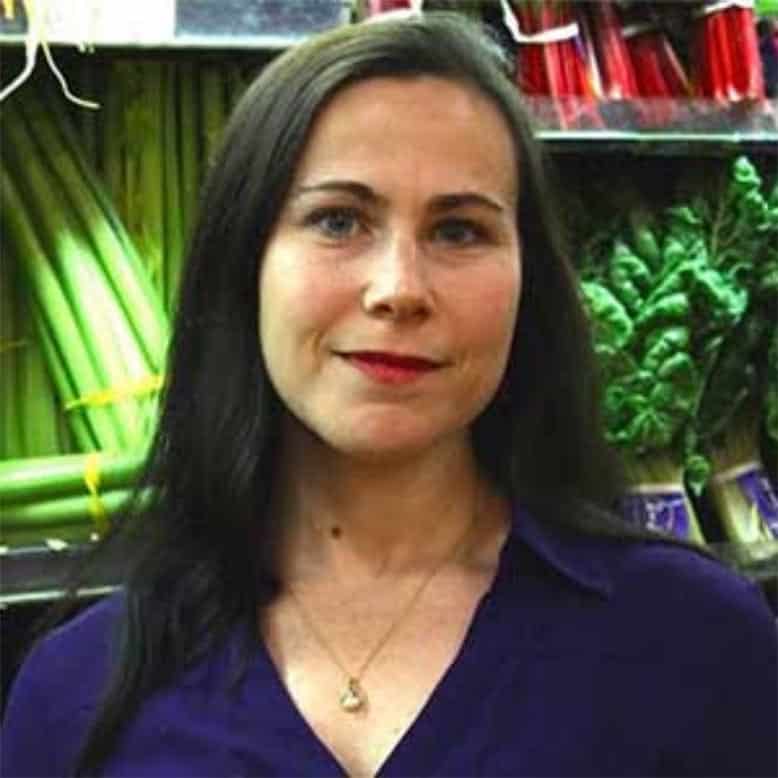
Amy Berger, MS, CNS, is a U.S. Air Force veteran and Certified Nutrition Specialist who specializes in helping people do “Keto Without the Crazy.”™ She has a master’s degree in human nutrition and writes about a wide range of health and nutrition-related topics, such as insulin, metabolism, weight loss, diabetes,... Read More
- The importance of changing fuel for your brain from sugar to fat.
- Common misconceptions about the ketogenic diet.
- Tips for avoiding the keto flu.
Heather Sandison, N.D.
Welcome to the Reverse Alzheimer’s Summit. I’m so excited to introduce you to Amy Berger. She is a US Air Force veteran and certified nutrition specialist who helps people do keto without the crazy. She writes about a wide range of health and nutrition-related topics, such as insulin, weight loss, diabetes, Alzheimer’s disease, thyroid function, and even more. She’s presented internationally on these issues and is the author of “The Alzheimer’s Antidote,” “The Stall Slayer,” and co-author of “End Your Carb Confusion” written with Dr. Eric Westman. She’s the lead nutritionist for Adapt Your Life Academy, where she helps create course content and has coached thousands of people through implementing low-carb keto diets safely and effectively. You can see why I’ve asked her to join us here today. Thank you so much, Amy. Welcome.
Amy Berger, MS, CNS, NTP
Thank you for having me.
Heather Sandison, N.D.
So let’s get into it. There’s a lot of controversy kind of, which I’m sort of surprised by, around using the ketogenic diet for dementia. And so part of this I think is that people make mistakes as they get into the ketogenic diet, so let’s start there. What are some of those common mistakes that you see people making as they go to transition into the ketogenic diet?
Amy Berger, MS, CNS, NTP
So it depends on what the goal is. A ketogenic or keto means a lot of different things to different people. And I think the way that you formulate the diet really depends on what you’re trying to accomplish. What is the goal? So for cognition specifically, it really just depends on the individual. I work a lot with weight loss and type two diabetes, metabolic syndrome, and there, I don’t wanna call it a mistake, but the misguided way of implementing it is that people are following macros, meaning the macronutrients, percentages of calories from fat, protein, and carbohydrate. They’ve been told that keto is a very high-fat diet. Just eat more and more fat, when what keto really is is very, very low carbohydrate. And I think that may be something that people are doing even for cognition that may be getting in the way. Keto is so popular now, which is great, but now you go to the store and you see keto granola and keto ice cream, and these things have a lot more carbohydrate than you realize, so you think you’re on a very low-carb diet and you’re really not, so you may not be getting the full effect that you would otherwise be getting.
Heather Sandison, N.D.
That’s actually one of the mistakes that we see here very commonly is that people walk into a store and they buy everything that says keto and it’s highly processed and it’s in a package and it has this K-E-T-O in great big letters on the front and then they’re like, “Well, why am I not getting into ketosis? When I measure it, it’s not working.” And what I’ve noticed that those packaged foods, especially at the beginning when you’re transitioning, they don’t help you get up over the hump and actually into ketosis. I don’t even know. Maybe they help for people when they’re just maintaining ketosis, but I’m not sure why they’re able to market that way. It just doesn’t make sense because the people we see eating them don’t get into ketosis. If people are measuring, ’cause we have a lot of people ask about like how many grams of carbohydrates can I have, so for the average person trying to get into ketosis, how many grams of carbohydrates can they have per day?
Amy Berger, MS, CNS, NTP
Yeah, that’s a good question because it really varies. Everybody varies in their own individual sensitivity to carbohydrate. A lean, active, young male can probably have a lot more carbohydrate and still be in a ketogenic state compared to someone who’s older, more sedentary. I was really privileged to work with Dr. Westman, as you mentioned, on our book and he’s been researching and helping people in the clinic for over 20 years. His program since day one has been 20 grams of carbohydrate or fewer per day, and that’s total carbohydrate, not net. Most people will be in ketosis at that 20 total grams or fewer. Some people can do 30, 40, 50. Then you’re kinda getting into territory where a lot fewer people will be in ketosis. And, of course, I wanna emphasize not everyone needs to be in ketosis. Some people can just kind of cut the carbs and reap a lot of benefits, but many of us don’t really experience the real magic or the real full effect of this metabolic shift, unless we go really, really low in the carbs.
Heather Sandison, N.D.
I think that a lot of people maybe listening don’t realize that like you and I, we don’t have dementia at this stage, but when I get into ketosis, my mental clarity, my mood, my sleep, so many things are better. And so this kinda shift in the fuel that we’re burning in our brains can give you that magic regardless of your stage in life. And so I think that’s another misconception is that we don’t have to wait to have dementia to get into ketosis.
Amy Berger, MS, CNS, NTP
Yeah, a lot of people report very early on that brain fog goes away and I think it’s precisely because finally the brain is gonna get some ketones. It’s gonna get a really good premium kind of fuel. And like you were saying not, we don’t have to wait. So many people do a low-carb or ketogenic diet for reasons completely unrelated to the weight loss and the diabetes that’s more well-known. People do it for the brain effects. It very often helps joint pain go away. Acid reflux goes away. People have more energy, like you said. A lot of people that mood boost. Keto is not automatically a diet solely for weight loss or even blood sugar. It really does so much else in the body.
Heather Sandison, N.D.
And then what about like pH, some people talk about pH and how a ketogenic diet is a very acidic diet. We had another speaker on the summit suggesting that. And so do you have any concerns about pH or balancing pH as you transition to keto?
Amy Berger, MS, CNS, NTP
No, you really cannot change the acidity or alkalinity of your blood with diet. If your blood is becoming acidic, there’s something else going on. A ketogenic diet, so this is one of the big misconceptions that’s out there, even among medical and nutrition and dietetics professionals. The nutritional ketosis induced by a very, very low carbohydrate intake is completely different from ketoacidosis where the blood is actually becoming acidic. They’re just completely different things. I have no concerns about acidity. If the concern is that people may be eating more meat, they may be eating more foods that are acid residue in the body, there’s just a lot of research out there showing that that does not affect the pH of the blood at all.
Heather Sandison, N.D.
I had someone suggest at one point that describing ketosis like what we’re talking about, getting on a good healthy ketogenic diet that’s high in vegetables, describing that as similar to diabetic ketoacidosis is essentially like comparing a sprinkle to a torrential downpour, right? So they’re very, very different in terms of the amounts of ketones and how much you’re shifting the chemistry of the blood. And then I think as kind of a good segue into like, okay, what is it that we’re eating on a ketogenic diet? Because this isn’t like bacon and cheese all day every day. What does a good, healthy, brain-healing ketogenic diet look like?
Amy Berger, MS, CNS, NTP
Well, I might have to be the devil’s advocate for a second. I think there’s nothing wrong with a lot of beef and cheese and bacon if that’s how somebody wants to go because the fact is, like we were saying earlier, some people might not reap the metabolic benefits of this way of eating, unless their carbohydrate intake is really low. And that might mean that someone has to limit even things like green leafy vegetables, non-starchy vegetables, things that we would otherwise really encourage. And it’s not that they’re prohibited, but the carbohydrate adds up. We don’t normally think of eggplant and zucchini and mushrooms and broccoli as being carbs. They are carbohydrate. They’re just not starchy, but if you overdo them, for some people, that actually will interfere with getting into deep enough ketosis.
But as a general rule, the diet is based on fat and protein, so basically fatty protein sources, whether that’s beef, pork, poultry, seafood, eggs, and you round things out with these non-starchy vegetables, dairy for those who tolerate it, high-fat dairy like cheese, heavy cream, butter, sour cream, nuts and seeds, nuts and seeds and cheese are very, very common trigger or binge foods, so some of us have to kinda stay away from those, but for those that tolerate that, it’s really just real food. The beauty of this is despite all the products available now, you don’t have to buy special products, eat special pills, order things through the mail. You can get everything you need at your local supermarket.
Heather Sandison, N.D.
That’s great. What would that look like? Tell me about a meal, a typical meal for someone on one of your programs.
Amy Berger, MS, CNS, NTP
It runs the gamut, but very often a nice piece of steak, whatever cut somebody likes, and a side of vegetables. It could be steamed broccoli with some olive oil on it. It could be roasted eggplant and basically a nice fatty protein with some vegetables.
Heather Sandison, N.D.
Yum, yum, and there’s so many ways to change up the spices and to keep that interesting and exciting. And then, of course, eggs, eggs become a great source of protein and fat and brain-healing nutrients as well. So what do you wish more people knew about the ketogenic diet and brain health?
Amy Berger, MS, CNS, NTP
Well, I just wish it was more widely known because it still shocks me, maybe it still shocks you after all this time, that every time you read an article about Alzheimer’s or cognitive impairment or decline in a mainstream press or even on the website for some of these Alzheimer’s organizations, there is no mention whatsoever of the brain glucose fuel deficiency. And in my thinking, that’s the main problem in the brain of somebody with Alzheimer’s is that we’ve lost the ability to harness energy from glucose. So these neurons are basically starving for fuel, and that’s never mentioned, so I think people might not have any idea why would anyone ever try a ketogenic diet for this problem. And it’s specifically for that reason, that ketones can serve as an alternative fuel for the brain. I’m honestly astounded that that’s not more widely known.
Heather Sandison, N.D.
Right, so what you’re describing, well, there’s a few things here to unpack, so one, there’s been this sort of doubling down over and over again on this beta-amyloid plaque hypothesis, that it’s beta-amyloid plaques that actually cause dementia, when in fact it seems as if other things, probably inflammation or nutrient utilization, many, many other, oxidative stress, genetic changes as we age, basically like the process of aging and then potentially infections, toxins, whatever causes inflammation for that person, that that’s what creates the beta-amyloid plaques and tau proteins and some of the histopathological things that we see that are associated, but not causative, when it comes to dementia. And so when you go to the Alzheimer’s Association or into any of these kind of places where you would conventionally go to get information, you don’t see the mention of diet and exercise and basic common sense kinda things that help with cognitive function and brain health. And so I hear your frustration and I share it. And then there’s this other piece that is breaking down kind of the biology of what’s going on in our brains as we age. And so I want you to talk about that in your book The Alzheimer’s Antidote. I was really impressed. I mean, the whole thing is just this phenomenal explanation of like what’s going on in the brain and why as we age, it’s harder for us to use sugar and so the answer is change the fuel. So talk a bit more about what’s happening in our brains and why it’s hard for us to use sugar as we age.
Amy Berger, MS, CNS, NTP
I think it appears to be somewhat quote unquote normal to have a little bit of decline as we age and that the reduced brain uptake and usage of glucose may be normal, but it used to happen very, very late in life, people in their 80s and 90s, and now we see people younger and younger afflicted. We see people in their 50s and 60s. And it’s mirroring what we see in other metabolic disorders, like type two diabetes or non-alcoholic fatty liver. These things are happening in children now, not the dementia is. They call Alzheimer’s disease type three diabetes or diabetes of the brain. And so this has really a lot to do with the fact that as we age, we lose insulin sensitivity. We become less able to process glucose properly and that has to do with a lot of things. We’re just less active in general as we age, many of us. We lose muscle mass, which is critical for remaining sensitive to insulin. It’s not normal. It’s just very common.
And I just think that if Alzheimer’s disease is primarily a metabolic problem, as I think it is, it really is not a surprise at all that people are getting afflicted younger and younger for whatever relation it might have to do with our modern diet and lifestyle, that we’re just eating so much carbohydrate all the time. It’s overwhelming the system. It’s forcing metabolism to a place it doesn’t wanna go. It’s interesting that nobody even questions whether diet and lifestyle play a role in things like obesity, cardiovascular disease, type two diabetes. And when it comes to the brain, we don’t even entertain the possibility that this could be every bit a diet and lifestyle problem, just like all those things are that are exploding in incidence just like Alzheimer’s is.
Heather Sandison, N.D.
Right, yeah. It’s wild to me that we’re not connecting these dots sooner and more clearly, but thank you for doing the work that you’re doing to help with that. So whenever someone is kind of considering this, if they already have dementia, do you see improvements? Or do you think that they’re just too far gone and there’s no point?
Amy Berger, MS, CNS, NTP
Oh, that is a good question. I don’t think it’s ever too late to try. You might as well try. And I do think there will be a point of no return. There will be a point at which somebody is so compromised and the disease is so advanced that you can’t really bring them back. In that scenario, I still recommend using what’s called the exogenous ketones, because at that point, that person is probably not capable of adhering to a ketogenic diet, but if we give them these exogenous ketones, they typically come as a drink or a powder that you can drink and it will elevate ketones even if you’re not on a ketogenic diet. Same thing with MCT oil. And I think that will close that fuel gap a little bit. That may provide some fuel to improve that person’s quality of life and cognition and improve their caregivers and loved ones’ quality of life in whatever time they have left. Now, if somebody’s in a much earlier stage, yeah, we do see improvement and it’s hard to kind of track it and document it, but I don’t know if Dale Bredesen is appearing in this event, but I mean, his work is phenomenal. Dr. Stephen Cunnane’s with brain ketone. And we do see some improvement.
We even see reversal depending on how you define it on the MoCa score or something like that where ketogenic diets or combined with exercise, sometimes combined with intermittent fasting really does improve cognition. So I think wherever you are in the process, it’s never too late to try something. I often also, I get asked sometimes, do I need a ketogenic diet to prevent Alzheimer’s? And I wish that we could say this prevents it. I don’t think we’re there. I don’t think we can promise that. What I do think you need to do to potentially prevent it and to remain cognitively healthy as you age is eat and live in a way that keeps the blood glucose and insulin levels within a healthy range. Make sure you’re getting enough B12, choline, thyroid. There’s a lot of things that can contribute to dementia totally apart from the glucose and insulin. So make sure you’re doing those things, but the amount of carbohydrate that any one individual can eat and still accomplish that will vary. Some people might need very low. Some people can have more. I don’t want people to think like, “Oh, I’m in my 50s, I’m in my 60s, it’s too late. I’ve been eating a standard Western diet my whole life.” I don’t think it’s ever too late.
Heather Sandison, N.D.
Yeah, you make so many great points there. What do you say to somebody who has been around through the ’80s and ’90s where there was this food pyramid that came from the federal government. Someone should go to jail for that. We were supposed to have eight servings of grains and carbohydrates and that was like the foundation and that we were supposed to avoid fats. So this has been so imprinted in so many of the people that I work with. How do you approach people when you’re having this conversation? Obviously, I feel strongly about this. I really think that that food pyramid and sharing that with people, I remember believing it and eating that way because I had seen it and that was what I was taught in school, and that has caused diabetes and obesity. I mean, it is just crazy. That has, I mean, literally probably caused death for many people to think that that’s the way they’re supposed to eat. And yet, we have to do the job of redefining what a healthy diet looks like. So what is some of the language that you’d use to help people kinda make that transition?
Amy Berger, MS, CNS, NTP
Yeah, I too remember feeling very self-righteous, spreading my margarine on my whole wheat toast and having skim milk in my fiber cereal. We’ve all been there. It’s interesting, most people who come to me for help are already on a low-carb or keto diet, so they’ve kind of already accepted that that kinda maybe wasn’t the best advice and they just need to tweak and individualize to get the results they want. When I get someone who’s new, I basically kinda say, this is the way I eat and I’m telling you to eat this way. I’ve made my career out of this. If I thought this was harmful, I wouldn’t be telling you to do it. Come to my apartment, look in my fridge. I feel that it’s safe. I’m betting my life and my career on it. And I think what really gets them to understand though is when you ask them about the low-fat, whole grains and all this stuff, well, how’s that working for you? Do you feel well? Do you feel great? Are you happy with your weight? Do you have good energy? And most of the time, if they’re seeking professional help, it’s because they don’t feel well. So it’s like, okay, you’ve already been doing that for five years, 20, 30 years. Maybe let’s try a different way because that’s not working so well. They never really stopped to think about that. And I think that kind of is more what convinces them to give it a try.
Heather Sandison, N.D.
Yeah, and then what about people who suggest that it’s like a fad diet or, oh, this is a lot like the Atkins diet and I thought that wasn’t good for your heart, what do you say to people who have those concerns?
Amy Berger, MS, CNS, NTP
It almost breaks my heart when I hear well-meaning medical and nutrition professionals tell people that this is just a fad. If it’s a fad, it’s a fad that’s been around for over 200 years. This is not a fad. It’s not going anywhere. There was mention in 1825 in the Physiology of Taste. It’s a very famous culinary book. Even back then 200 years ago, they knew this was for weight loss, but if you were heavy, lay off they called it the farinaceous and saccharine foods, the starchy and sweet foods, this old timey language back then, but it’s really, it’s not a fad. What it actually is is very, very basic human physiology and biochemistry. Let’s look at beta oxidation. Let’s look at the Krebs cycle. Let’s look at what’s going on in the body. Not only is it not a fad, it makes perfect biochemical sense. I don’t really know how to say it any other way. If it’s a fad, it’s been around for 200 years because it works. If it really didn’t work, people wouldn’t still be gravitating toward it.
Heather Sandison, N.D.
And I thought you were gonna say 200,000 years because this is an ancestral diet, really more than anything is what we’re doing is approximating what our hunter-gatherer ancestors did where they sometimes had carbohydrates available and sometimes did not. And that ability to go back and forth between burning carbs for fuel and burning fats for fuel is ingrained in our DNA, and our bodies work best when there is some fasting or a fasting-mimicking diet, and you mentioned intermittent fasting. So our bodies really work best in an environment where there’s a little bit of stress, where we don’t always have abundant food available, where we exercise, where we have to get movement. These things are all part of how we are designed. And when we spend our entire lives in a state of sort of like gluttony, always consuming sugars, our brains and our bodies essentially respond to that by being less functional.
Amy Berger, MS, CNS, NTP
Yeah, I think, isn’t there a saying starving makes you smarter? I don’t want anyone to starve themselves, but sort of when you’re without food and the fat burning of your stored fat ramps up and you’ve got all these ketones coming through the brain, you are sharper. That’s what we said that the brain fog goes away. How many of us know, let’s say in a previous higher carb life, you eat a nice big lunch and then around 3:00 you’re half asleep in front of your computer trying to do work.
Heather Sandison, N.D.
Right and I mean, it’s clear, for us, of course. Now, is it sustainable? So do you suggest that people stay in ketosis forever or is there some sort of bouncing back and forth?
Amy Berger, MS, CNS, NTP
Another good question. And the answer again is it depends. I don’t think everybody needs to be in ketosis all the time forever. I also think that some people can be doing all the right things dietarily and they just won’t ever really have super elevated ketones. They may be kinda skirting the line, but that’s all they need. That’s enough for them to feel their best. I think popping in and out is fine ’cause I think some people can thrive on a low-carb diet without necessarily being ultra ketogenic. But what I don’t like for people to do is do keto for a week, then have a carb bend, or do keto for a week, have a bend, you’re not gonna really get anywhere doing that. And the thing also is everybody probably varies in the ketone level that makes them feel best. I hate for people to feel disappointed or feel like they’re doing something wrong if they’re kind of only seeing low levels. In fact, a lot of people don’t even really need to measure depending on what they’re trying to do.
But with the sustainability, I think, and I don’t know if you’ll agree or not, but I think the reason people think it’s unsustainable is because these are the people who think they have to have a spreadsheet and an app and weigh and measure the food and track it and have the ring and everything and all the food has to be organic, it all has to be pasture raised. That is unsustainable trying to manage all of those levers at once. If you are a data lover and you want to do that and if you have the budget to afford that kind of premium food, go for it. But there’s gonna be several, several thousand, million, a few million people out there who can’t do that. They just want to eat food that’s very low in carbohydrate. They’ll just do the best they can afford at the store. And they don’t have to weigh and measure everything and write it down and keep track. I think there are people who really enjoy that and that’s fine. That over-complication is a barrier to entry for a lot of people. It’s unsustainable because they think they have to do all that. If they learn that you probably don’t, then it’s a lot easier to do for the long term.
Heather Sandison, N.D.
Yeah, I think that’s important. It doesn’t have to be perfect, but just going in that direction will start to get benefit. I do see people who kind of struggle to get over one millimole in terms of ketones. And anecdotally, I’m curious what you’ve seen too, we see that when people get up over one, they tend to get more of the benefit. When they get up over two, they tend to get even more benefit. And when they get up to three, they get even more benefit. Usually pushing those ketones higher if possible gets you feeling even better. Now, not that we want everybody to stay there again forever, but when you push it higher, there seems to be like additional magic to get from it.
Amy Berger, MS, CNS, NTP
I think there is for some people. I definitely think so. And this is where either sometimes the MCT oil or exogenous ketones can come in or really, really keeping those carbs low. It’s interesting from Dr. Westman’s history, I guess, I mentioned earlier, he uses total carbohydrate rather than net because when you stop subtracting the net carbs, the fiber and the sugar alcohols, your carbohydrate intake is, by default, going to become much, much lower. It’s a small change that often makes a very big difference with regard to ketosis. It could mean the difference between someone not being in ketosis at all versus being in or being higher ketone. I do see also though some people when they start to get four millimolar or so, they actually start to feel like a little agitated and not so well, so I think there’s a sweet spot somewhere in there. Some people, yes, I think they do feel sharper thinking, also that’s when the hunger goes away. Sometimes the mood, a lot of people with mood problems feel much better when it’s higher, so there is a rationale for aiming for higher.
Heather Sandison, N.D.
I think it’s such a great point that I hear you making over and over is that this is an individualized diet. That, yes, we wanna flip that switch from burning sugar to burning fat for fuel. And how you get there and what you do and the particulars of what you eat may be different. And these are some really great considerations to have in there. Maybe you get to two and feel best there, but your husband or your wife feels best at three or at one. We don’t have to get attached to the details around all of this, but just going in that direction is so helpful. So then what about the ketone flu? I wanna make sure we cover that because this is one of those things that as people go in the direction of getting into ketosis, sometimes they feel worse before they feel better. So how do you support patients with that?
Amy Berger, MS, CNS, NTP
Yeah, not everyone experiences it at all. Some people transition and they just sail through and it’s no problem. Other people, there’s a couple of different things going on, all of which are easy to manage if you’re prepared for them and if you know about them. What causes that keto flu, that sort of uncomfortable, unpleasant adaptation is usually rapid shifts in electrolytes. Nine times out of 10, just using a lot more salt will help people. And it’s another one of those sort of misguided dietary demons. Sodium is an essential nutrient. We need it. And there are some people with sodium-sensitive conditions. Most people can really have a lot more salt than they realize and be fine. And when you’re on a very, very low carbohydrate diet, your body needs more sodium because the diet has a natural diuretic effect and you will lose more sodium. The headaches, the fatigue, the sluggishness, the dizziness, sodium will take care of that most of the time. Muscle cramps typically respond to magnesium.
Heather Sandison, N.D.
Instead of just sodium, having like a mixed mineral, do you usually recommend that?
Amy Berger, MS, CNS, NTP
Honestly, if people want to do that, the fancy, gray, Celtic Himalayan salt, that’s fine. But what the body really needs is the sodium, so any salt is fine, but if you prefer an unrefined kind of high-quality salt, and you can afford it, great. But I think the biggest thing that people are not aware of is that if you’re taking certain medications, you have to be very careful when you adopt a ketogenic diet because the metabolic changes happen so rapidly that you might get side effects from the medication that you weren’t getting before. And specifically, the big ones are medications for diabetes, especially insulin, but some of the oral drugs too, and drugs for high blood pressure, because keto is so good for bringing down blood sugar and blood pressure all by itself, sometimes within days, within days of starting the diet, that those medications have to be adjusted almost immediately in some cases. And if you don’t know to do that, if your doctor doesn’t instruct you in what to look out for and how to adjust, then you will be over-medicated and so your blood sugar’s gonna be too low or your blood pressure is gonna be too low. Of course, you’re going to feel awful, but don’t blame the diet for what the medication is doing. That’s the thing. But really, I don’t want people to be scared of the keto flu. It’s not that bad. The worst of it should pass in a day or two. And it’s like you said, you’ll feel worse before you feel better. When somebody quits smoking, they’re coughing, they’re wheezing, it’s terrible, and then they feel better. No one would ever tell you, well, just keep smoking ’cause you don’t wanna go through that terrible period.
Heather Sandison, N.D.
It’s almost like a withdrawal from the sugar addiction.
Amy Berger, MS, CNS, NTP
Yes. Yeah, I think that too. I think a lot of it is the electrolytes, but I think there is some degree of the brain screaming out for sugar, yeah.
Heather Sandison, N.D.
Yeah. Yeah. I’ve certainly felt that when I go to get into ketosis or go into a fast of like just craving, insatiable carb cravings, and getting up and over that, staying really well hydrated, having those exogenous ketones, there are some strategies, having quick, easy snacks around so that you can distract yourself with something else, staying busy, those kinds of things can help you get up and over it so that you can get all of that benefit that’s waiting for you on the other side. What else should people know about the ketogenic diet and brain health?
Amy Berger, MS, CNS, NTP
Hmm. Well, I think, I mean, like I said, if speaking about Alzheimer’s specifically, the diet plays a huge role, but like a vitamin B12 deficiency all by itself can cause cognitive problems and other neurological problems. So you wanna get evaluated for the sort of low hanging fruit so to speak, things that would be easy to rule out or easy to correct. Same thing with undiagnosed or improperly treated hypothyroidism. But I think, I think regarding brain health, it’s hard to say which is more important, what you are eating or what you’re not eating. I guess I would want people to really know, you may disagree, there’s no such thing as a super food. There’s no magical miracle elixir that you can drink or these berries that they just discovered in the Amazon rainforest last month, I think it really, you support your brain by supporting the rest of your body. And we do that with good quality nutritious food, preferably food that doesn’t completely spike the blood sugar and insulin all day long, up and down on that roller coaster. So I think what’s good for the body is good for the brain. I think people are still looking for some miracle solution or like, oh, I can just take this thing, use this pill. Unfortunately, we’re not there. This is a multifactorial thing. It’s not that complicated. You just eat good food. Like we were saying, you don’t have to pull 45 different levers and manage every little detail. There’s a couple of very small things you can do that have a very big impact.
Heather Sandison, N.D.
Yeah, it’s this common sense approach. It’s just unfortunately not common practice because we’ve been so socialized to think there’s gonna be this amazing scientific discovery. Like you said, we’re gonna discover something in the rainforest or on the coral reef and there’s gonna be this pill that we can create that’s gonna make sure that I never have dementia or by the time I’m old enough to need some support, that discovery will have been made. And yet, what we really need to go back to is just those foundations of really good high-quality health that is living in the way our body was designed, so getting plenty of movement, getting plenty of sleep, getting good nutritious foods that are not processed, that don’t come in a package. All of these pieces that we know are healthy, this is the common sense. We know these things are healthy, managing our stressors and meditating or praying or doing whatever our soul needs to feel balanced. All of these pieces are so foundational. And when we complicate it by pushing and doing all of these like pretty unnatural things, that is when our bodies start to break down.
Amy Berger, MS, CNS, NTP
Yeah, yeah, I agree. But I think in my thinking because of again the aspect of fueling the brain, I do think that the diet is the biggest lever. That’s the thing that’s probably the easiest to change and that has the biggest impact. And then if able, if and as when able, incorporate exercise, meditation, get some fresh air, get some sunlight, these other things, I think it’s great if you can address a lot of those things at once, but if you can’t, it makes it that much more crucial to really hunker down and be strict with the things you can do.
Heather Sandison, N.D.
I tell people that if they’re not willing to do the diet, that does about 50% of the work at least, and so if you’re not willing to do the diet, I just basically am like, it’s not worth spending your money, spending your time obsessing about these other things if you haven’t done that. And so we’re on the same page there for sure. The diet is paramount and so important. And yeah, it’s the fuel, it’s the fuel we’re feeding our brain. And I think you were sort of alluding to this here is it’s also a great entry point because it gives us more energy and then people start sleeping better, so it starts to compound. And if that can be the way in to getting the changes, then you have that energy, so now you can go exercise. You’re not as inflamed, so now you don’t have as much pain. All of those things really help.
Amy Berger, MS, CNS, NTP
Yeah, I see this all the time. People that were exhausted, sedentary, their joints hurt, and they go on keto and within a few weeks, sometimes months, sometimes within weeks, they’re up and about. They want to be more active because they can be now. They have the energy. The pain is gone. Not always, but it’s…
Heather Sandison, N.D.
Often enough.
Amy Berger, MS, CNS, NTP
It’s pretty remarkable.
Heather Sandison, N.D.
Often enough that it is well worth a try. Amy, thank you so much for your time and for being here. I wanna make sure everyone knows where they can get your books and find out more about what you have to offer.
Amy Berger, MS, CNS, NTP
Sure, my first book is this book about Alzheimer’s, it’s called The Alzheimer’s Antidote. My second book is called The Stall Slayer and it’s about breaking fat loss stalls on low carb and keto diets. And the third book with Dr. Westman is End Your Carb Confusion. They are all all available on Amazon or preferably ask your local book, independent book seller to carry it. I have a YouTube channel called Tuit Nutrition, T-U-I-T Nutrition, and that’s my handle on Twitter. That’s really my main social media is Twitter and it’s Tuit Nutrition, and I have a website, but it could use an overhaul. I’m gonna point people toward adaptyourlifeacademy.com. That’s where we have online forces about keto diets, adaptyourlifeacademy.com.
Heather Sandison, N.D.
Fantastic, thank you so much for the work you do in the world. I know you are helping other people, supporting other people in really amazing ways and making sure that they live healthier, more functional lives and that they keep their brains healthy well into their eighth, ninth, and 10th decades. So I can’t tell you how grateful I am for your time and your expertise and for sharing your wisdom today.
Amy Berger, MS, CNS, NTP
Well, thank you so much. I’m happy to be here.
Downloads

